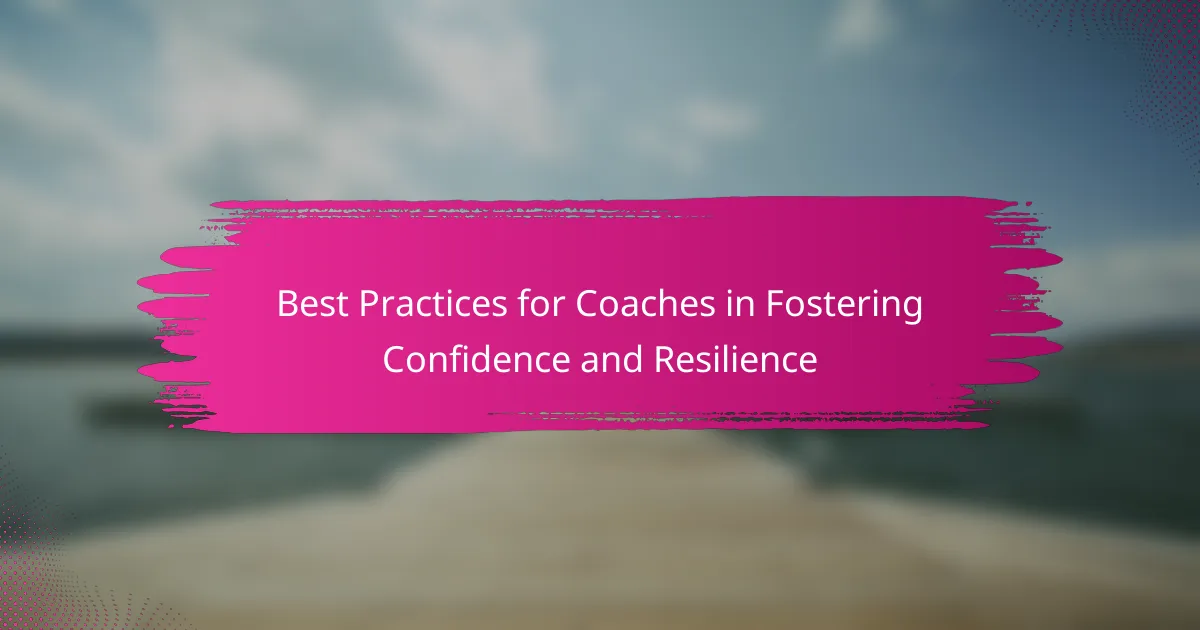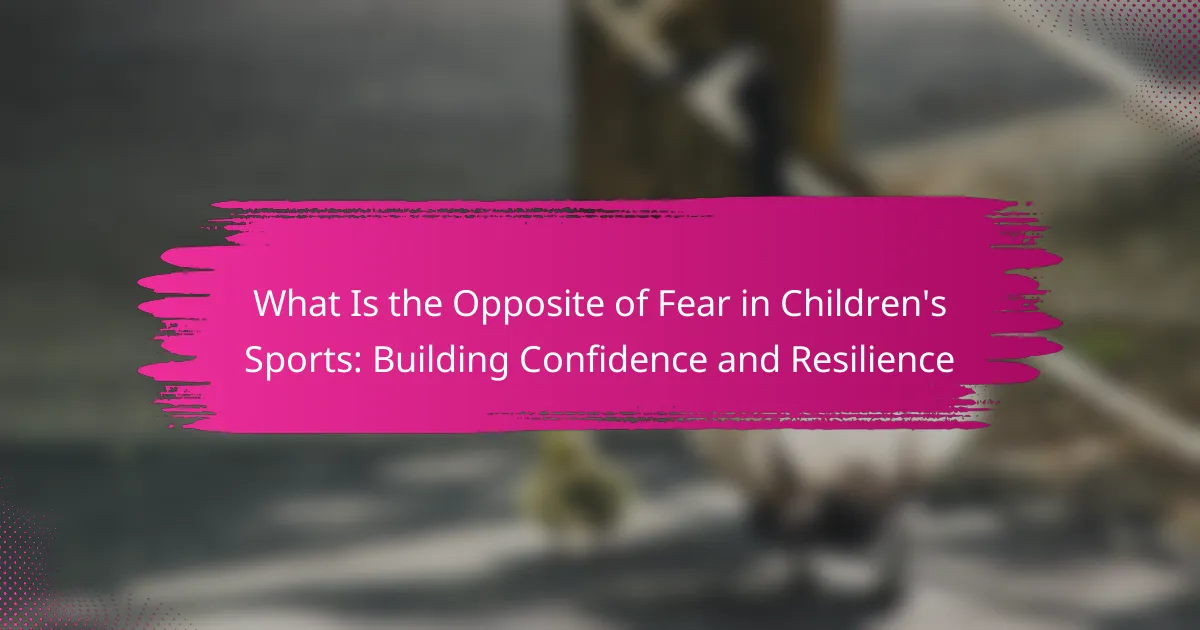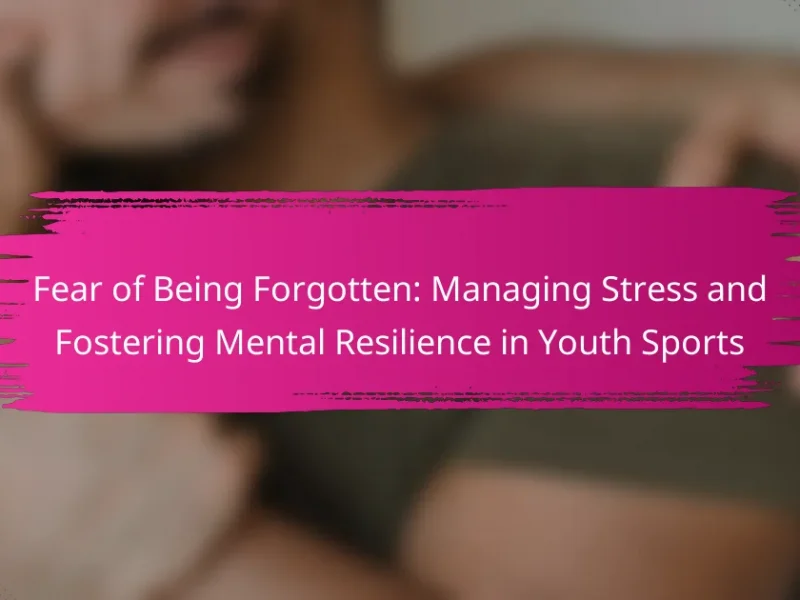Building confidence and resilience in children’s sports is crucial for overcoming fear and enhancing performance. This article explores how confidence empowers children to face challenges, the role of supportive environments, and the importance of positive reinforcement. It also discusses strategies for parents and coaches to foster a growth mindset and set achievable goals, ultimately promoting a healthy athletic development.

What Is the Opposite of Fear in Children’s Sports?
The opposite of fear in children’s sports is confidence. Building confidence fosters resilience, enabling children to face challenges and setbacks positively. Encouraging a growth mindset can enhance their self-esteem and performance. Engaging in supportive team environments and celebrating small achievements further reinforces their belief in their abilities.
How Does Confidence Manifest in Young Athletes?
Confidence in young athletes manifests through self-belief, positive self-talk, and resilience in the face of challenges. This psychological state enhances performance and encourages risk-taking in sports. Young athletes with high confidence exhibit better focus, improved decision-making, and a willingness to learn from mistakes. Research indicates that fostering a supportive environment significantly boosts confidence levels, allowing athletes to thrive and develop essential life skills.
What Role Does Resilience Play in Sports Performance?
Resilience significantly enhances sports performance by enabling athletes to overcome challenges. It fosters mental toughness, allowing children to face setbacks without fear. Building resilience in youth sports leads to improved focus, greater persistence, and a stronger sense of self-efficacy. These attributes contribute to a more confident athlete who can perform under pressure. As a result, children with resilience are more likely to embrace competition and learn from their experiences, ultimately enhancing their overall sports performance.

Universal Attributes of Confidence and Resilience
Building confidence and resilience in children’s sports counters fear effectively. Confidence empowers children to face challenges, while resilience helps them recover from setbacks. Both attributes foster a positive mindset essential for athletic development. Research shows that children with higher confidence levels are more likely to engage in sports and persist through difficulties, enhancing their overall performance and enjoyment. Additionally, resilience equips them to handle competition pressures, turning potential failures into learning opportunities.
What Are the Key Characteristics of Confident Young Athletes?
Confident young athletes display resilience, self-belief, and a positive mindset. They embrace challenges and view setbacks as opportunities for growth. Key characteristics include strong communication skills, goal-setting abilities, and a supportive social network. These attributes foster a culture of encouragement, enhancing overall performance and enjoyment in sports.
How Does Resilience Contribute to Long-Term Athletic Success?
Resilience significantly enhances long-term athletic success by fostering a positive mindset. It enables athletes to overcome challenges, adapt to setbacks, and maintain motivation. Studies show that resilient athletes demonstrate improved performance under pressure, leading to sustained achievements. This unique attribute of resilience is essential in sports, as it cultivates confidence and perseverance, allowing young athletes to thrive in competitive environments.

Unique Attributes of Building Confidence in Sports
Building confidence in sports involves unique attributes that enhance a child’s performance and enjoyment. Key attributes include positive reinforcement, skill mastery, and supportive environments. Positive reinforcement builds self-esteem, while skill mastery fosters a sense of achievement. Supportive environments, including coaches and teammates, further encourage resilience and confidence. These elements combine to create a robust framework for overcoming fear and developing a strong sporting identity.
What Techniques Foster Confidence in Children During Sports?
Encouraging confidence in children during sports involves techniques such as positive reinforcement, skill development, and fostering a supportive environment. Positive reinforcement builds self-esteem by acknowledging achievements, while skill development enhances competence. A supportive environment encourages risk-taking and resilience.
How Can Coaches Tailor Approaches to Individual Needs?
Coaches can tailor approaches to individual needs by fostering a supportive environment that encourages confidence and resilience. Personalizing feedback and adapting training techniques can help children overcome fear in sports.
Understanding each child’s unique attributes, such as their emotional responses and skill levels, allows coaches to create specific strategies. For instance, using positive reinforcement can build confidence, while gradual exposure to challenging situations can enhance resilience.
By recognizing these root attributes, coaches can effectively empower children to face challenges in sports, transforming fear into a growth opportunity. This tailored approach ultimately supports their development both on and off the field.

Rare Attributes Influencing Mental Development
Building confidence and resilience in children’s sports counters fear effectively. Rare attributes influencing this development include encouragement, positive reinforcement, and supportive environments. These factors foster a sense of safety, enabling children to take risks and learn from failures. Research shows that children exposed to these attributes demonstrate improved self-esteem and performance in sports.
What Psychological Factors Enhance Resilience in Young Athletes?
Psychological factors that enhance resilience in young athletes include self-efficacy, positive self-talk, and emotional regulation. Self-efficacy, or belief in one’s abilities, significantly boosts confidence. Positive self-talk encourages a constructive mindset, helping athletes cope with challenges. Emotional regulation allows young athletes to manage stress and maintain focus during competition. These factors collectively foster a resilient attitude, enabling athletes to overcome fear and perform at their best.
How Do Family Dynamics Affect a Child’s Confidence in Sports?
Family dynamics significantly influence a child’s confidence in sports. Supportive environments foster resilience and self-esteem, while negative dynamics can instill fear and doubt. Encouragement from family members boosts a child’s belief in their abilities, leading to improved performance and enjoyment in sports. Additionally, open communication within the family allows children to express their feelings, further enhancing their confidence. A positive family atmosphere creates a foundation for children to develop the skills necessary to face challenges in sports and life.
What Role Does Peer Support Play in Building Resilience?
Peer support significantly enhances resilience in children participating in sports. It fosters a sense of belonging and encourages positive interactions, which are crucial for building confidence. Children who engage with supportive peers often display increased motivation and reduced anxiety, leading to improved performance. Studies indicate that peer encouragement can lead to a 30% increase in self-esteem among young athletes. As a result, the role of peer support is vital in transforming fear into resilience, enabling children to face challenges with confidence.

How Can Parents Support Their Children’s Mental Development in Sports?
Parents can support their children’s mental development in sports by fostering confidence and resilience. Encouraging a positive mindset helps children overcome fear and embrace challenges.
Promoting a growth mindset is essential. Children learn that effort leads to improvement, which builds confidence. Parents should celebrate progress, not just outcomes. This reinforces the idea that mistakes are part of learning.
Setting realistic goals is another key strategy. Specific, achievable targets help children focus on their development. When they reach these goals, their confidence grows, creating a cycle of success.
Creating a supportive environment is crucial. Parents should provide emotional support and encouragement during both successes and setbacks. This builds resilience, teaching children to bounce back from disappointments.
What Are Effective Strategies for Encouraging a Fearless Mindset?
To encourage a fearless mindset in children’s sports, focus on building confidence and resilience through supportive environments. Strategies include fostering a growth mindset, setting achievable goals, and celebrating progress. Encourage positive self-talk and emphasize effort over outcome. Provide opportunities for practice and exposure to challenges, allowing children to learn from failures. Consistent reinforcement of their abilities cultivates a strong sense of self-efficacy.
How Can Parents Identify Signs of Stress in Young Athletes?
Parents can identify signs of stress in young athletes through behavioral changes, emotional responses, and physical symptoms. Look for increased irritability, withdrawal from activities, and changes in sleep or appetite. Monitoring these signs helps build confidence and resilience in sports. Recognizing stress early allows parents to provide support, fostering a positive environment that encourages healthy coping mechanisms.

What Common Mistakes Should Be Avoided When Building Confidence?
To build confidence in children’s sports, avoid these common mistakes. Focusing excessively on winning can create pressure and fear of failure. Neglecting individual progress undermines personal growth and resilience. Providing insufficient positive reinforcement can diminish motivation. Overemphasizing competition may hinder teamwork and enjoyment. Lastly, failing to model confidence can prevent children from learning effective coping strategies.
How Can Overemphasis on Winning Impact a Child’s Mental Health?
Overemphasis on winning can negatively affect a child’s mental health by fostering anxiety and fear of failure. This pressure can diminish their confidence and resilience, essential traits for healthy development in sports. Children may experience stress and burnout, leading to decreased enjoyment and participation. As a result, fostering a balanced approach that values effort and personal growth over winning is crucial for nurturing a positive mindset in young athletes.

Best Practices for Coaches in Fostering Confidence and Resilience
Building confidence and resilience in children’s sports is essential for overcoming fear. Coaches can implement several best practices to achieve this goal.
First, create a supportive environment where children feel safe to express themselves. Encourage open communication and validate their feelings. This fosters trust and allows athletes to tackle challenges without fear of judgment.
Second, set achievable goals that promote a sense of accomplishment. Break larger objectives into smaller, manageable tasks. This incremental approach helps children build confidence as they experience success.
Third, incorporate positive reinforcement. Celebrate efforts and improvements, not just outcomes. This helps children understand that resilience is about persistence and growth.
Lastly, model resilience through your own behavior. Share personal experiences of overcoming obstacles. This demonstrates that setbacks are a natural part of growth and encourages children to adopt a similar mindset.
What Training Methods Are Most Effective for Encouraging Mental Growth?
Effective training methods for encouraging mental growth in children’s sports focus on building confidence and resilience. Techniques such as positive reinforcement, goal-setting, and mental visualization significantly enhance a child’s self-esteem and adaptability.
Positive reinforcement involves acknowledging achievements, fostering a supportive environment that encourages risk-taking. Goal-setting helps children develop a sense of purpose, breaking down larger objectives into manageable tasks. Mental visualization allows young athletes to mentally rehearse success, enhancing their performance and reducing anxiety.
Incorporating these methods promotes a growth mindset, enabling children to view challenges as opportunities for learning. Engaging in regular discussions about feelings and experiences can further bolster emotional resilience, creating a holistic approach to mental growth in sports.
How Can Coaches Create an Environment That Reduces Fear?
Coaches can create an environment that reduces fear by fostering confidence and resilience in young athletes. Encouraging a growth mindset helps children view challenges as opportunities. Providing positive reinforcement builds self-esteem, while setting realistic goals promotes achievable success. Creating a supportive team atmosphere encourages collaboration and reduces competitive pressure. Regular feedback enhances skill development, making athletes feel more competent and secure.

What Resources Are Available for Supporting Mental Development in Sports?
To support mental development in sports, resources focus on building confidence and resilience in children. Programs emphasize positive reinforcement, goal-setting techniques, and mindfulness practices. Workshops for coaches and parents enhance understanding of psychological strategies. Access to sports psychologists provides tailored support, addressing unique challenges. Community sports initiatives foster teamwork and social skills, creating a supportive environment.
How Can Workshops and Programs Help Coaches and Parents?
Workshops and programs enhance confidence and resilience in children’s sports by providing structured support. They teach coaches and parents effective strategies to foster a positive environment. These initiatives focus on building self-esteem through skill development and positive reinforcement. As a result, children learn to overcome fear and embrace challenges, which is essential for their growth in sports.
What Literature and Tools Are Recommended for Further Learning?
To enhance understanding of building confidence and resilience in children’s sports, several literature and tools are recommended. Books like “Mindset: The New Psychology of Success” by Carol S. Dweck explore the growth mindset, essential for fostering resilience. “The Inner Game of Tennis” by W. Timothy Gallwey provides insights into overcoming mental barriers.
Additionally, tools such as visualization techniques and positive affirmation exercises can significantly boost a child’s confidence. Online platforms like the Positive Coaching Alliance offer resources and workshops aimed at coaches and parents to create a supportive sports environment. Engaging with these materials can deepen knowledge and practical application in nurturing children’s sports experiences.

How to Implement a Holistic Approach to Child Athlete Development?
Building confidence and resilience in child athletes is essential for their development. A holistic approach focuses on emotional, social, and physical growth.
Encourage a supportive environment where children feel safe to take risks. This can be achieved through positive reinforcement and constructive feedback. Regularly set achievable goals that allow athletes to experience success, fostering self-belief.
Incorporate mental training techniques such as visualization and mindfulness. These practices help children manage anxiety and enhance focus during competitions.
Promote teamwork and social connections within sports. Engaging in group activities builds camaraderie, teaching children to rely on others and develop resilience through shared experiences.
What Collaborative Efforts Between Coaches and Parents Are Most Effective?
Effective collaborative efforts between coaches and parents focus on communication, support, and shared goals. Regular meetings between coaches and parents foster alignment on children’s sports objectives. Coaches can provide feedback on players’ progress, while parents can share insights on their children’s emotional needs. This partnership builds confidence and resilience in young athletes by creating a supportive environment. Encouraging parents to attend practices and games enhances their involvement, reinforcing positive experiences for children. Ultimately, a united approach nurtures a child’s growth in sports, promoting both skill development and emotional well-being.
How Can Community Support Enhance a Child’s Athletic Experience?
Community support significantly enhances a child’s athletic experience by fostering confidence and resilience. When children receive encouragement from family, friends, and teammates, they feel more secure in their abilities. This support creates a positive environment where children can take risks and learn from failures without the fear of judgment.
For instance, studies show that children who participate in team sports with strong community backing are more likely to develop a growth mindset. This mindset allows them to view challenges as opportunities for improvement. Additionally, community involvement can lead to increased participation rates, providing children with more opportunities to engage in physical activity and develop essential skills.
As a result, children who experience robust community support are better equipped to handle setbacks, ultimately enhancing their overall athletic journey. This support system not only boosts performance but also contributes to lifelong lessons in teamwork and perseverance.


